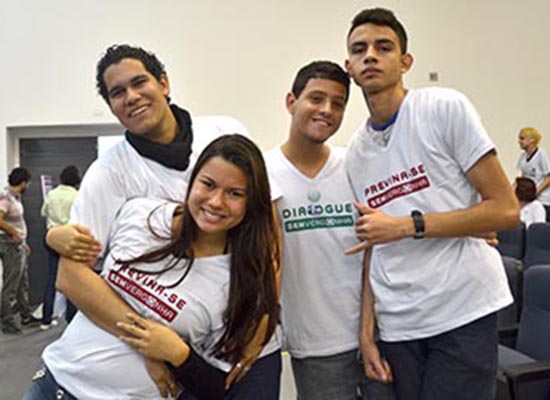 Los estudiantes de las escuelas públicas de Brasil han creado una campaña llamada “Sin vergüenza” para promover la salud sexual y reproductiva en las escuelas. MenCare+, que en Brasil se llama “Mais Pai”, en asociación con el Grupo Gestor de Salud y Prevención en las Escuelas (un programa del Gobierno Federal) y la Secretaría de Educación del Estado de Río de Janeiro, lanzó la campaña en noviembre, junto con estudiantes y profesores de 10 escuelas públicas de Río de Janeiro.
Los estudiantes de las escuelas públicas de Brasil han creado una campaña llamada “Sin vergüenza” para promover la salud sexual y reproductiva en las escuelas. MenCare+, que en Brasil se llama “Mais Pai”, en asociación con el Grupo Gestor de Salud y Prevención en las Escuelas (un programa del Gobierno Federal) y la Secretaría de Educación del Estado de Río de Janeiro, lanzó la campaña en noviembre, junto con estudiantes y profesores de 10 escuelas públicas de Río de Janeiro.
“Sin vergüenza” fue creada por un grupo de 12 estudiantes de secundaria que participaron en talleres educativos para generar conciencia sobre género y desarrollaron todo, desde el concepto y el nombre de la campaña hasta la redacción de sus mensajes. El concepto de la campaña surgió de la necesidad de romper los patrones de género que a menudo obstaculizan la comunicación sobre sexualidad entre los jóvenes y dificultan el uso del condón durante los encuentros sexuales. El nombre, “Sem Vergonha” en portugués, surgió del deseo de discutir críticamente los estereotipos y dar un nuevo significado a la palabra “sin vergüenza”.
Durante el evento de lanzamiento, los estudiantes que participaron en la creación de la campaña invitaron a los 100 estudiantes presentes a actuar como portavoces de la campaña en sus respectivas escuelas.
Las actividades de la campaña se realizarán entre el 25 de noviembre y el 16 de diciembre (en el marco de los 16 Días de Activismo contra la Violencia de Género) en siete escuelas del estado de Río de Janeiro. A través de Facebook, los estudiantes compartirán información sobre género, sexualidad y salud. Se distribuirá un folleto informativo y carteles en las escuelas y se presentarán cuatro videos, en los que los propios estudiantes actuarán las escenas, que abordarán los temas de la campaña.
MenCare+: una iniciativa global
La campaña “Shameless” es parte de MenCare+, una iniciativa más amplia destinada no sólo a aumentar la educación sobre salud sexual y reproductiva de los jóvenes, sino también a involucrar a los hombres en relaciones de género equitativas y conexión emocional con sus hijos, parejas y ellos mismos.
MenCare+ fomenta la crianza activa de los hijos, la participación de los padres en la atención prenatal, la promoción de la salud materna e infantil, la prevención de la violencia contra las mujeres y los niños y el asesoramiento a los hombres que cometen actos de violencia. La iniciativa está financiada por el Ministerio de Asuntos Exteriores de los Países Bajos y está siendo implementada por organizaciones asociadas en Brasil, Ruanda, Sudáfrica e Indonesia.